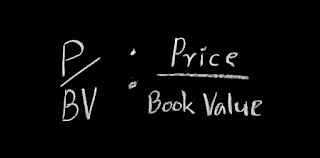 |
| Price to Book Value |
You might think of a firm’s Price to Book ratio in a similar
manner. Price is the money you pay per
share. Book Value may be
thought of as the company’s net assets, if the company were liquidated, distributed
to stock holders on a per share basis.
Let’s say you pay $100 a share for the stock of a company. The next day the company is liquidated and
the proceeds from the sale of all its assets are used to pay off its
liabilities. Whatever’s left is then
divided among the shares outstanding, paid to the holders of record. If the proceeds paid per share are $50 then
the Price ($100) to Book ($50) ratio would be 2:1.
As you can see, you don’t want to pay much more than the
book value of a firm as a hedge against the worst case scenario. Ben Graham and Warrant Buffett advocated that
value investors pay no more than twice the book value of a firm and preferably less
than that.
 |
| What is the Price to Book Ratio? |
Below are the 10 Dividend Champions with the lowest P/B
ratio as of 1.31.19. As you can see, the
top 3 firms were actually available for pennies on the dollar and have increased
their dividends every single year for 25+ years!
Company
|
P / B
|
Telephone & Data Sys.
|
0.89
|
NACCO Industries
|
0.98
|
People's United Financial
|
0.98
|
Universal Corp.
|
1.09
|
Old Republic International
|
1.13
|
United Bankshares Inc.
|
1.13
|
First Financial Corp.
|
1.19
|
AT&T Inc.
|
1.19
|
Chubb Limited
|
1.21
|
Community Trust Banc.
|
1.31
|
As with other factors discussed here,
here,
here,
and here,
Price to Book should not be the only one you consider in deciding where to
plant your seed money. However, the best
value investors in the world pay a great deal of attention the price they’re
paying relative to the value they’re receiving.
A wise Dividend
Farmer will do the same.
The
thoughts and opinions expressed here are those of the author, who is not a
financial professional. Perspectives offered should not be considered
investment advice. They are presented for discussion and entertainment
purposes only. For specific investment advice or assistance, please
contact a registered investment advisor, licensed broker, or other financial
professional.
No comments:
Post a Comment